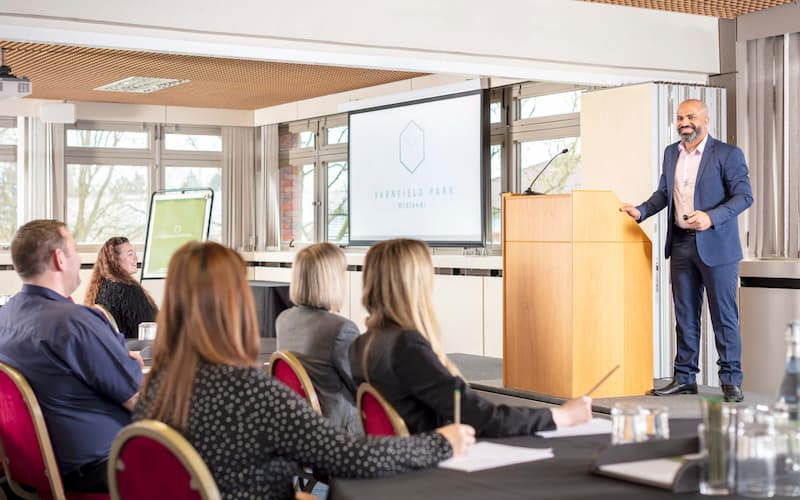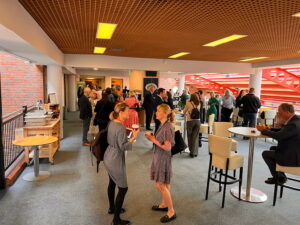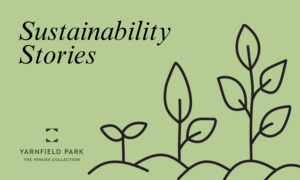
A Guide To Sustainable Events
Sustainability is at the forefront of many people’s minds, especially the onus being put on businesses and organisations to improve their environmental impact. There are many news stories in the media about campaigners and many customers are looking for sustainable options that mean businesses are having to make sustainable changes to how their business operates.
Whilst the average person is doing their best to recycle and use less plastic and paper, it’s also important for certain industries to consider their impact on the environment. It’s important for event planners and the events industry to consider a range of sustainable factors when organising a large green event such as choosing a sustainable conference centre.
Why You Should Choose a Sustainable Conference Venue
Choosing a sustainable conference venue has become essential for success in today’s meetings and conference industry. Sustainability grows increasingly more important as more meeting planners and venues are often asked about their implementation of specific green initiatives. Event venues are finding that initiating sustainable practices within their business is as good for them as it is for the planet.
1. Responsible Recycling
Take the opportunity when you are searching for a sustainable venue to take responsibility for your rubbish and make sure the venue holds these measures in place. You can feel good knowing leftover food and waste is donated or put to compost instead of being taken to local landfill sites.
2. Water and Energy Conservation
Many modern sustainable conference venues these days really are going above and beyond to assure their venues are as eco friendly as possible. We would recommend choosing a venue that cuts its water flow. Whether this is by introducing low flow toilets, speciality lighting systems, or introducing censored showers, this will make an impact on decreasing greenhouse gas emissions and shows a venue is willing to make an investment into improving their sustainability.
3. Green Cleaning
Many event spaces take the opportunity to follow green cleaning programmes to prioritise their employees and visitors safe. Meaning, cleaning materials contain low volatile organic compounds.
Volatile organic compounds include many different harsh chemicals that have long term health effects. These safer alternatives ensure visitors and employees arent exposed to these chemicals which are often found in public buildings.
How to hold a Sustainable Event
Public consciousness is constantly growing, and businesses are starting to recognise the impact of making a positive environmental impact. This is why now, more than ever we should be making decisions that are going to benefit our environment. So here we have created a few helpful tips on how to make sure that your conference event is sustainable.
Opt-in For Meat Free Catering
It is definitely worth finding out if your sustainable conference event venue can cater for a meat-free diet for you and your conference attendees. This is one of the best things you can do to stop climate change – it’s also delicious and loads of fun! The average British carnivore eats more than 11,000 animals in their lifetime which requires a vast amount of land, fuel, and water to reach the plate.
Behind most joints of beef or chicken on our plates are a large amount of wasteful land and an energy-hungry system of farming that devastates forests, pollutes oceans, rivers, seas and air, depends on oil and coal and is significantly responsible for climate change increasing carbon emissions.
At Yarnfield Park, our sustainable conference venue has launched the ‘Meetings for Change’ initiative, allowing the venues to be eco-conscious when creating locally sourced menus for customers that choose to be environmentally friendly.
Explore how The Venue Collection’s Executive Chef tries to create an eco-conscious menu.
Having Tap Water Instead of Bottled
One of the most obvious, and easiest ways of assuring your venue is sustainable is by reducing the amount of plastic waste. Encouraging all of your participants to not purchase bottled water and finding out whether your event venue can supply glasses and a jug of tap water for your meeting room is one of the simplest ways to reduce plastic ways and make your conference venue sustainable.
Despite the UK having some of the best quality drinking water in the world! The average human being throws away at least 7.7 billion plastic water bottles a year. An estimated 15 million bottles are littered, landfilled, or incinerated every day, producing 233,000 tonnes of CO2 emissions a year.
One of the easiest ways you can be sure that your conference event is eco friendly, trying to reduce the amount of wasted water and CO2 emissions by opting in for tap water over bottled.
Select a Conference Venue with Good Public Transport Links
When you select a conference or training centre, ensure it has good public transport links, this not only helps your delegates with attending your event, but it also helps to reduce carbon emissions. Good public transport, cycle lanes or being in close proximity to busy areas meant people can walk to your venue and will reduce car traffic arriving at your venue. Did you know that approximately 85% of greenhouse gas emissions are created by road vehicles?
Public transport continues to be a more cost-effective alternative in cities that lack parking zones. In low-density areas, the cost of commuting across large travel zones and the upkeep of vehicles is expensive.
Our conference venue in Yarnfield offers an easy and accessible route to Stoke and Stafford train station, as well as many local bus stations.
Be Economical with Printed Materials
Another way of ensuring your conference event is sustainable is exchanging printed materials for digital copies of documents. A good way to reduce paper is to encourage your delegates to bring a laptop or present information over email. Many venues, such as Yarnfield Park, offer projectors, whiteboards, and free Wi-Fi to encourage you to go paperless.
Exchanging paper for media materials helps to reduce greenhouse gas emissions that contribute to climate change. It takes less energy and water to recycle paper than to create new paper from trees. Manufacturing with recycled paper cuts down population levels that contribute to smog and bad health.
Conclusion
Exchanging paper for media materials helps to reduce the impact of greenhouse gas emissions that contribute to climate change. It takes less energy and water to recycle paper than to create new paper from trees. Manufacturing with recycled paper cuts down population levels that contribute to smog and bad health.
Yarnfield Park Sustainable Conference Venue
At Yarnfield Park we are proud to operate a social purpose framework to make sure the impact we have on the world around us is a positive one. We recognise the risks to the planet from climate change which is why as part of our Future First Charter we created ‘Meetings for Change’
For all of our meetings and conference events, we believe in, using fresh and seasonal products, zero waste, the power of plants, ethical sourcing, and protecting the planet.
At Yarnfield park we are now facilitating amazing virtual & hybrid experiences. Meaning our virtual event experts have the knowledge and experience you need to make your hybrid event a success without stress. Our online event involves people interacting in a virtual environment on the web instead of meeting in a physical location like a venue.
We believe that virtual events will never be able to replace the real experience of face to face conferences, but if you would prefer to go the extra mile for your organisation and assure that you are holding a fully sustainable conference event then you can trust our team to deliver this for you.
If you would like to find out more information on how Yarnfield Park can benefit your business and help you host a sustainable conference event then please feel free to contact us, and we will be more than happy to help.
If you require more guidance on your conference planning then check out this blog post here on Handy Hints for Conference Planning.
Go back to other articles

